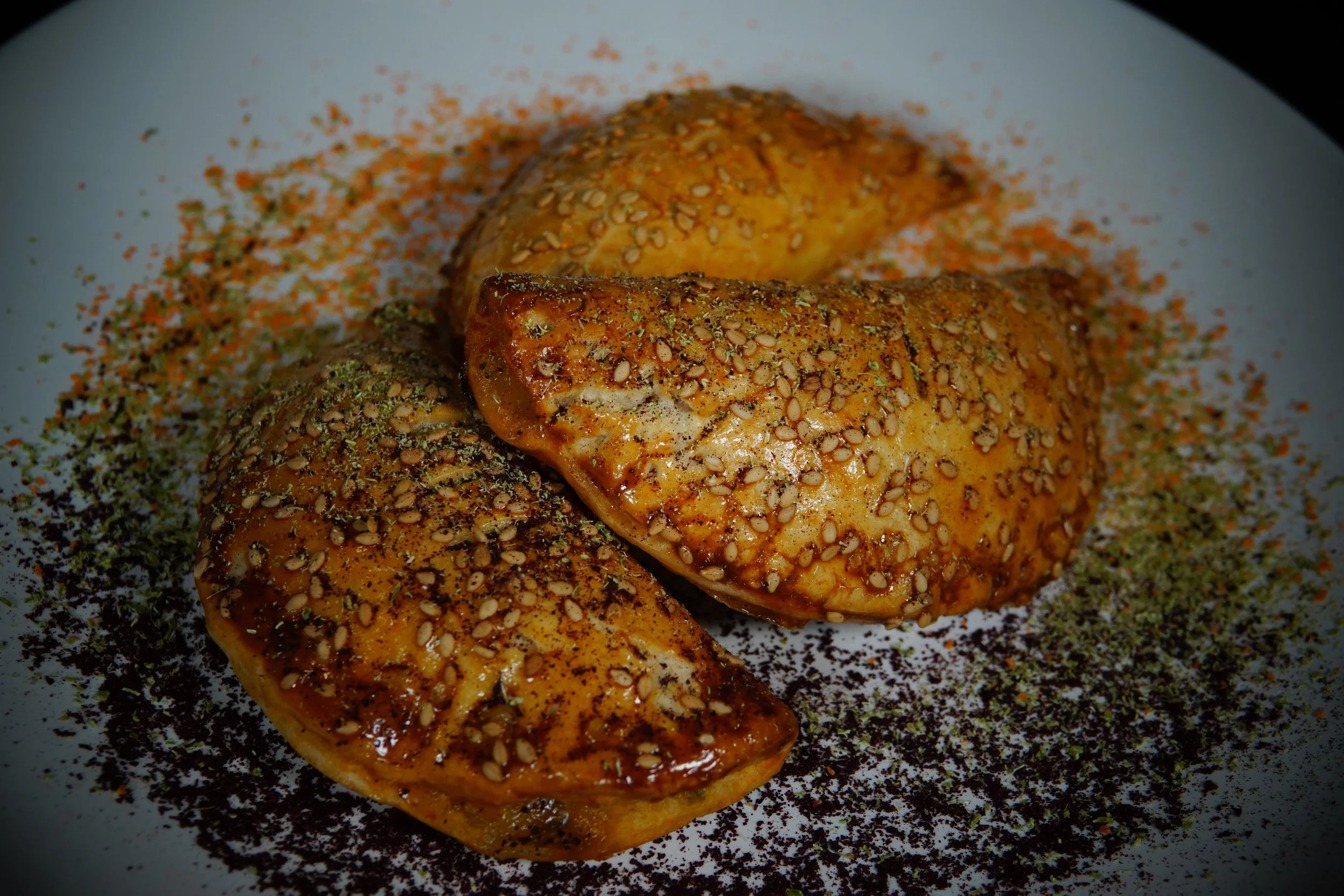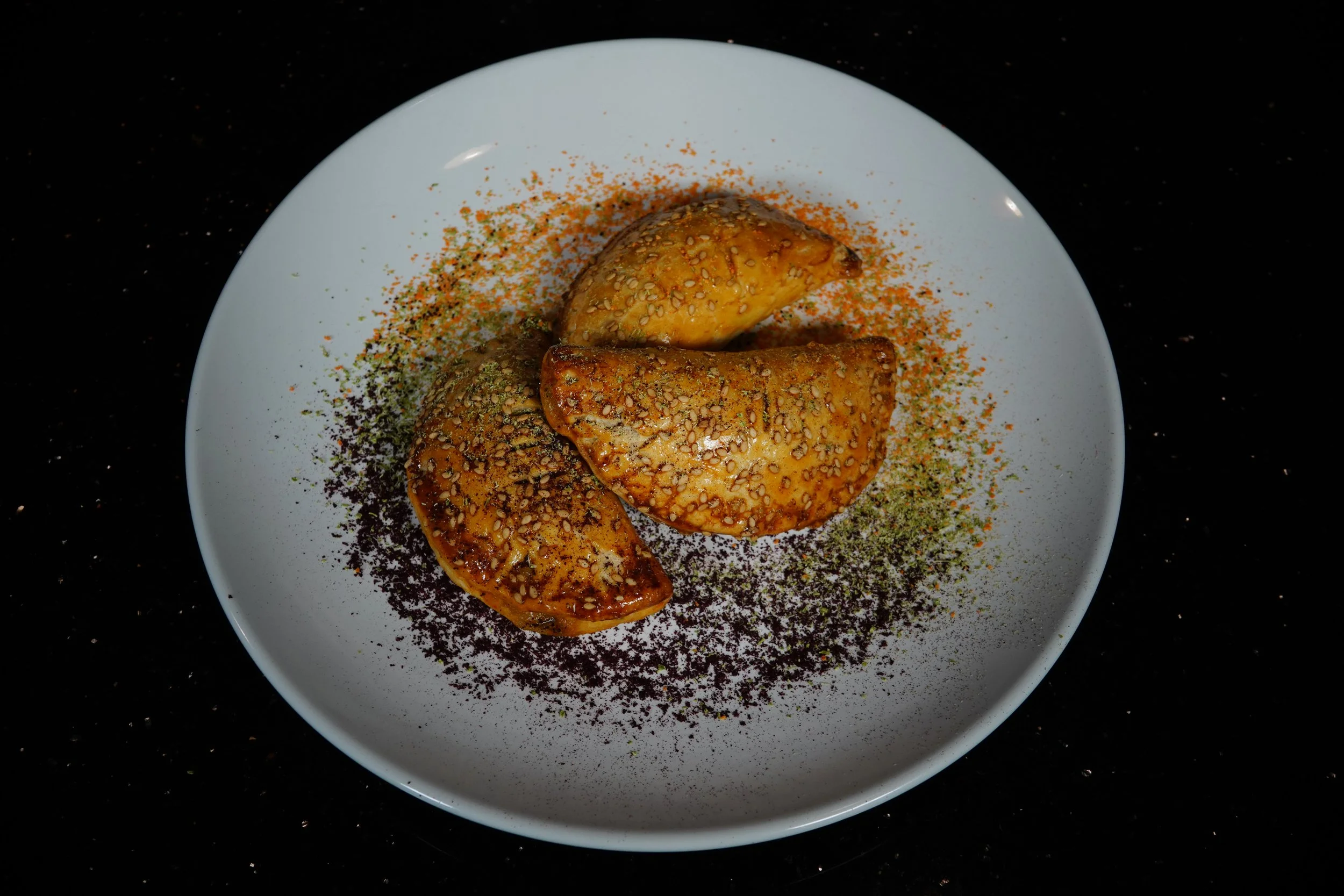Voodoo by D’Angelo - Etouffee Empanadas
D’Angelo’s Voodoo is a passionate composition that embraces the human experience, from irresistible natural pleasures to heavy hearted woes. Its organic sound and stripped-down framework convey a sense of connectivity; music so embedded in its roots yet perfectly unique for its place in time. Recorded on analog equipment with live instruments for a vintage feel, Voodoo displays all the soulful, spiritual, romantic sounds of greats like Marvin Gaye and Curtis Mayfield, while channeling the street funk sounds of the 90’s Hip Hop movement. This blend of tradition and new age was D’Angelo’s breakthrough after years of frustration with the club/pop direction in which R&B music was headed at the time, as well as writer’s block of his own. In response, he revisited his southern church upbringing and African ancestry to create a piece of music that evoked powerful emotion. Whether it be Voodoo’s delicate vocal ad-libs or reversed soundbites, the lack of conventional structure expresses D’Angelo’s breaking down of walls and confidence in his true self.
Voodoo is straight up sexy. The slow seductive rhythms impose a gravitational pull, while audacious lyrics dance softly on your ears with an enchanting cadence. D’Angelo utilizes simple, steady-tempo percussion (courtesy of Questlove), swinging bluesy guitar riffs, soulful brass horns, and angelic vocal leads to portray pleasure, temptation, vulnerability, and desire. The raw, unfiltered style of the record gives a sense of empowerment to the listener, a validation of the feelings we experience around ourselves, the people closest to us, and the environments in which we live.
Voodoo starts off with D’Angelo flexing his masculine presence on “Playa Playa,” “Devil’s Pie,” and “Left to Right.” Flooded with Hip Hop percussion and heavy bass, he showcases his street side with a smooth operator tone. As the music progresses, D’Angelo’s vulnerability starts to peak its head on songs like “The Line” and “Send it On,” where he sings of the pressures and insecurities he faces. He gradually reveals his feminine side with tender vocals and strong emotions on songs like “One Mo’Gin,” “The Root,” and “Feel like Makin’ Love.” Finally, he taps into his roots for an emotional call out to both his ancestors and newly born on “Africa",” a powerful yet delicate final track that beautifully portrays his unification of old and new.
What Voodoo does best is bring us back to the simple pleasures of life. When I listen to songs like “Chicken Grease” and “Playa Playa,” I feel like I’m in the room with him vibing out as he improvises in real time. This intimate connection D’Angelo creates between himself and his listeners influenced me to create a hands-on experience that engages with the most basic, indulgent desires of good food. A dish so richly rooted in cultural traditions that its flavor is unmistakable and unwavering. A soulful plate that’s by no means good for you, but that’s why it’s so damn appealing. Unpolished, messy, flat out sexy; irresistible flavor with a spellcasting first bite: Etouffee Empanadas.
The Etouffee Empanadas are delicate flakey pastries caressing a rich sauce-bound filling, exploding with flavors native to the Louisiana area, famously New Orleans. However, the cultural roots of the food and music go back even further to ancient African traditions, as D’Angelo explains in an interview from 2000, “I named the album Voodoo because I really was trying to give a notion to how powerful music is and how we as artists, when we cross over, need to respect the power of music. Voodoo is ancient African tradition. We use ‘voodoo’ in the drums or whatever, the cadences and call-out to our ancestors and that in itself will invoke spirits. And music has the power to do that, to evoke emotions, evoke spirit. That’s something I learned in the church when I was very young and that’s what I wanted to get across” (Jet, 2000.) Taking inspiration from African, Creole and Cajun cuisine, this plate holds a long lineage of authentic culinary traditions.
The empanada filling is a mixture of etouffee, a rich seafood stew, and jollof rice, a popular rice dish in West African cuisine. Etouffee is a staple in both Cajun and Creole cooking, a flavor bomb of seafood broth binding a dynamic blend of vegetables, seafood, herbs, and powerful spices. Its cultural roots are apparent by the name, the preparation, and the flavor, a dish created for and by the people. I wanted the Etouffee to be at the center of the dish, along with the direct tie to Africa in the jollof rice to capture the cultural roots that so wonderfully encase Voodoo.
The intimacy of the dish comes through as a delicate, savory pastry wraps up all the warm, powerful flavors of the etouffee and jollof. The pastry is mainly a representation of D’Angelo’s feminine side, the tender vocal work and emotional vulnerability. But it does something else as well; stuffing the etouffee in a flakey pastry enables you to have an intimate experience. It encourages you to eat with your hands, to dive in, indulge and get messy with pleasure, not shame. The empanadas also ensure that your first bite is just as delicious as your last, which reflects the level of cohesion maintained throughout the record.
Ironically, the album title is “Voodoo,” which is a defining characteristic of New Orleans culture, a connection I didn’t even make until after I came up with this recipe. So, to shoutout the Cajun and Creole roots in this dish, I garnished the empanadas with a few different powders made of beets, celery, and carrots for a New Orleans color display.
I hope you enjoyed the recipe and album breakdown. Visit the recipes page to get a hold of the recipe. Take your time with this one, the recipe is a bit more intensive but can easily be spread out over a few days. The album is kind of the same, the shortest track is 4 minutes and 38 seconds and takes some commitment for a full 1 hour and 18-minute listen through, but making it through to the end is worth every moment. Until next time.









